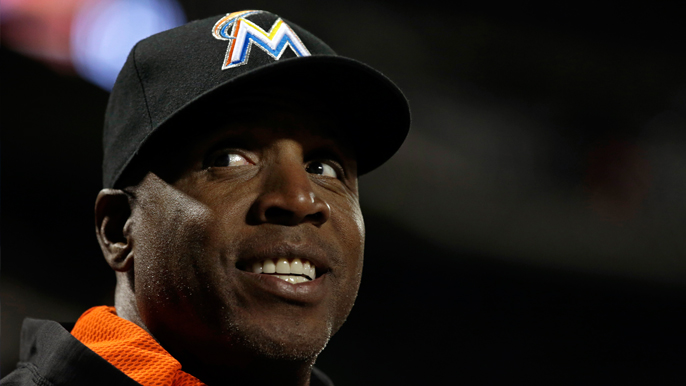It’s always a good idea to learn from those before you, so I once kneeled at the foot of the great Bay Area sportswriter Art Spander.
He noted that famous curmudgeonly golfer Nick Faldo was retiring and embarking on a broadcasting career. Sir Arthur said: “Like they always say, ‘when it’s time to say goodbye, they finally choose to say ‘hello’.”
Point being, the jerkiest athletes understand that after the playing career, they need their bread buttered. They need income. They need to play the game of public relations.
Cue Barry Bonds and his ‘Sorry I Was A Jerkola’ Tour.
The latest is Barry’s full admission to Sports on Earth that his 22 years in the big leagues, a reign of baseball and media relations terror lasting from 1986-2007, was “straight stupid.” Why was Barry a five-star grump/borderline misanthrope during that time? “It’s on me,” Barry said. “I was a dumbass.”
READ: Bonds opens up about relationship with media: ‘I was straight stupid’
Two immediate takeaways:
— One: Barry desperately craves his spot in Cooperstown next to his godfather, Willie Mays.
He knows he’s sabotaged his chances at the Hall by cultivating a relationship with BALCO that resulted in a body of which pro wrestlers were jealous. We can spend plenty more time than a brief visit to KNBR.com debating whether it’s right or wrong to keep the Steroid Era out of the Hall of Fame. And we can spend even more time debating whether it’s fair that Bonds is essentially taking the bullet for an entire generation, vilified because he was the best there ever was, letting hundreds of lesser lights who used performance-enhancing drugs scurry by in the cover of anonymity.
But the fact is, Bonds’ Cooperstown chances have one foot in the grave and the other on a banana peel. If he is going to pull a Warriors-over-Thunder comeback and somehow find his way to the dais in upstate New York one July, it sure helps to launch a massive charm offensive after spending more than two decades basically telling anybody who bothered to stray near his locker to use their hats as a toilet.
The voters are human. While they insist they vote on numbers and integrity — and I firmly believe they do; I have supported the BBWAA’s overall body of Cooperstown work — they are also able to adjust and change. And if Barry keeps smiling in dugouts and giving reporters time and admitting that, all along, they were right, he was wrong …. well, it won’t hurt his comeback chances. It’s been said that tragedy plus time equals comedy. For Bonds, the tragedy of his career plus time plus sweetened-up media relations gives him a better chance than ever before.
— Two: There is substance to Barry’s comments. I do believe that, deep down, there is a human being in there who understands how badly he screwed up, and how badly he wants to apologize.
For years, those close to Barry — people like Mike Krukow and Duane Kuiper; teammates through the years — have insisted that Barry can be a likable, engaging, funny and, most of all, incredibly helpful teammate. His oceans-deep knowledge of the game has been passed down behind closed doors. When he wants, he can be a substantive interview.
I’ve always believed, from a dime-store psychologist’s perspective, that Barry’s public persona was a product of many things. I believe we cannot discount his father’s career; the pressure that came with being the “next Willie Mays” always trailed Bobby Bonds, and maybe caused Barry to resent the press for saddling Bobby with that. I believe that race has been a factor, too — that Barry learned from Mays and his father that the predominantly white media was not on the same page as the two most important men in his life; that Willie was born black in the Deep South and began his career in the Negro Leagues; and that Bobby, born in 1946, viewed the white media through the justifiably suspicious prism of the 1960s, when race relations were front-burner issues. I don’t know if these subjects were overt with Barry, but I do believe they were at least a subconscious part of Barry’s tangling with the press.
I was lucky enough to be invited to the Jim Davenport memorial service in May. A startling thing happened. Barry Bonds, having arrived only the night before with the Miami Marlins, was sitting in the front row, next to Mays. He was not listed as a speaker. But he asked to speak, and did so with eloquence and heart. He asked Davenport’s widow, Betty, and Barry’s own mother, Pat, to come stand next to him. He cut open a vein and talked about the friendship between his father and Davvy, and the two women on stage. And he spoke to Davenport’s spirit, and told him how much he admired his teaching of the game, the import of passing on the game. He was emotional, and he told Davenport, somewhere in baseball heaven, “I get it now, Davvy. I get it.”
Whether or not you think it’s too late for Barry to say so, and whether it’s for altruistic reasons or calculated, he is letting us all know now that he gets it now. How you process it is up to you as a ball fan.



